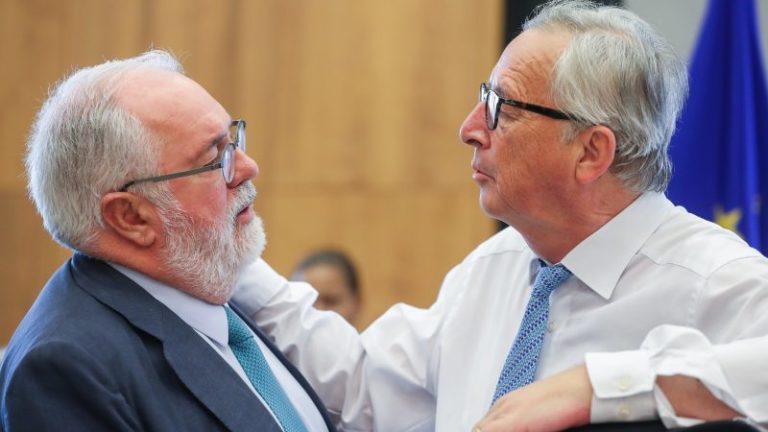
Business leaders have urged the EU to scrap greenhouse gas emissions by 2050 and increase climate ambition in time to stick to the Paris Agreement, in a letter seen by EURACTIV.
CEOs of companies like food giant Unilever, financial powerhouse Allianz SE and power providers Engie and EDF have penned a joint letter to EU climate chief Miguel Arias Cañete, urging him to make sure the European Commission’s 2050 strategy includes a net-zero emissions option.
Cañete is due to announce the long-term strategy on Wednesday (28 November) and EURACTIV understands that it will include eight scenarios from which member states will be expected to pick.
According to EU sources, the strategy survived its first acid test last Thursday (22 November) when a meeting of special experts from each of the 28 Commissioners’ cabinets signed off on the text without making substantial changes.
Heads of cabinet will scrutinise the strategy on Monday (26 November), before the Commissioners themselves meet on Wednesday morning ahead of the big unveiling.
Although a European Parliament resolution from last month and ten EU countries have called on the Commission to include net-zero emission options in its strategy, their inclusion is still not 100% guaranteed.
The letter, sent by not-for-profit initiative The B Team, warns Cañete that “we cannot do business” in a world that exists under the current climate trajectory, which is predicted to hit at least 3 degrees Celsius of warming by century’s end, rather than the 1.5 or 2 degrees goals set by the Paris Agreement.
In September, the UN’s Intergovernmental Panel on Climate Change (IPCC) released a landmark report into what warming beyond 1.5 degrees would mean for the world, concluding that it would have devastating impacts.
Entrepreneurs like Sir Richard Branson, Unilver boss Paul Polman, International Trade Union Confederation chief Sharan Burrow and Danone CEO Emmanuel Faber put pen to paper on the B Team letter, which insists that net-zero emissions must feature among the options in the EU’s 2050 strategy. They also insist that the EU’s current 2030 emissions reduction target of 40% must be increased to 45%.
EURACTIV understands that the long-term strategy actually uses 45% as its baseline for 2030, given that Commission projections show that new EU energy rules mean the bloc is on track to “de facto” reduce emissions by 45%.
Cost of inaction
In the letter, dated 20 November, 21 high profile names, including the UN’s former climate change boss, Christiana Figueres, insist that “the cost of inaction is greater than the cost of action”, adding that a net-zero target will “set the direction of travel for all European businesses”.
“Business as usual is not an option. We cannot afford the price of inaction,” added Brook Riley from Rockwool International, the insulation company.
The European Environmental Bureau’s Roland Joebstl told EURACTIV that “Europe suffers €13 bln of climate damages year after year. Any head of state and finance minister must be able to put two and two together and realise their inaction is more costly than action.”
The letter was warmly welcomed by The Prince of Wales’s Corporate Leaders Group (CLG), who themselves called on environment ministers in October to ensure the EU hits net-zero emissions by 2050 with their own letter.
“The CLG has repeatedly called for a decisive commitment to net zero emissions by 2050 to secure a future that promises more jobs, better homes, clean air, restored forests and trillions saved on energy imports,” CLG Director Eliot Whittington told EURACTIV.
“Anything less than zero emissions by 2050 is inadequate, and those trying to slow the pace of change will ultimately get left behind,” he added.
However, the Commission strategy will fall short of making a cast-iron cost of inaction case, as EURACTIV understands that it will not include the cost of climate damages in its scenarios.
Climate damages are estimated at anything between a few billion euros to even trillions of euros over the next decades if no further decarbonisation is achieved but the Commission’s climate modellers claim that they are too unpredictable to factor in.
Much of that hesitation stems from the insistence that climate change does not respect national borders so including costs for phenomena that the EU would have no direct control over would not be politically viable.
Member states will have to agree on one of the eight scenarios to follow, although a final decision is not expected before the end of next year.
This December’s Council summit could be an opportunity for leaders to welcome the strategy in their conclusions, given that they were the ones that tasked the EU executive in March to draft the text.
It is still not confirmed whether Commission President Jean-Claude Juncker will present the strategy during COP24 in Poland but it is likely to feature heavily during the European elections campaigning and the future of Europe summit in Sibiu, Romania, in May.
Source: euractiv.com
< Back to all entries
